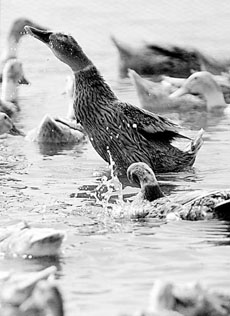| Home / English Column / Environment / Environment -- Ecological China | Tools: Save | Print | E-mail | Most Read |
| Fishing for Better Ways to Protect the Paddies |
| Adjust font size: |
Despite the achievement, This should not be the future picture in the world's largest rice farming country, said Ma Tianjie, rice project manager of Greenpeace Ma said ecological rice farming would reduce the use of pesticides and fertilizers, environmental pollution and the residue in rice. Disease prevention The Greenpeace report, which was released earlier this month, lists ways of ecological rice planting, such as combining ancient experience with modern science in pest and disease prevention while avoiding overusing chemicals. In They plant different varieties of rice in certain proportions and in certain distance from one another. Some varieties can resist rice blast, but may not have high outputs. However, planting them together with the high-output varieties may reduce the rate of rice blast and at the same time maintain the output. Similar methods have been used to prevent rice bacterial leaf blight, another rice disease caused by bacteria. According to Zhu, the rate of rice blast among conventional rice is between 20 percent and 45 percent, while the biodiversity-based rice planting only has 0.05 percent to 5 percent of blast rice rate. "Many of the rice blast-resistant varieties are traditional species that only farmers in the remote mountainous areas in "Tapping their traditional techniques and interbreeding the traditional varieties with modern high-output breeds, we are able to find ways of not using fungicides," Zhou said. Zhou said the biodiversity-based rice planting has been expanded in Organic ducks
After the rice seedlings grow about one week, young ducks are driven into the paddy fields and then they will live there until rice begins to grow ears. According to Zhang Jia'en, a professor of agricultural ecology at Guangzhou-based The consistent activities of ducks also help rice grow stronger, and promote it to bear fruits more quickly. "In our studies, in a rice-duck growth period, each duck need only to be fed 0.5 kilograms of fodders. It can get enough food by eating weeds, pests and other planktons," Zhang told China Daily. Duck excrement is an ideal fertilizer. Zhang's studies show that each duck can produce up to 10 kilograms of excrement. If a duck is grown in every 50 square meters, its excrement can meet rice's most nutritional demands. The ecological rice from Zhang's experimental fields now sells at a higher price in the market, with a bright future in profit making.
Zhang's field experiment also yields an unexpected result. The activities of duck in the paddy field can reduce the emission of methane, the secondary greenhouse gas in terms of contributing to global warming. Asian rice field is a major source of methane and "But the activities of ducks break the cycle of soil microorganisms and reduce the amount of methane they emitted," said Zhang, adding his team will soon publish such a paper in leading international science journals. In
A farmer in When rice seedlings are grown, farmers put fries into the paddy fields, which will then grow in the water in the fields. The fish in the paddy fields feed on insects and their eggs, such as rice borers, plant hoppers and leaf rollers. By adjusting water levels, fish can jump to catch the pests feeding on the rice plant. They also feed on the nucleus of the bacteria which causes sheath and culm (stem) blight. The fish excrement also acts as a rich fertilizer. Breeding fish in rice fields also helps eliminate mosquitoes because the fish eat the larvae. The Greenpeace report indicates that in some paddy fields with fish, 89.6 per cent of weeds can be eliminated and the density of mosquito larvae decreased by 50 per cent. Economically, rice fish farmers use 50 per cent less pesticides. ( |
| Tools: Save | Print | E-mail | Most Read |
 |
| Related Stories |
|


